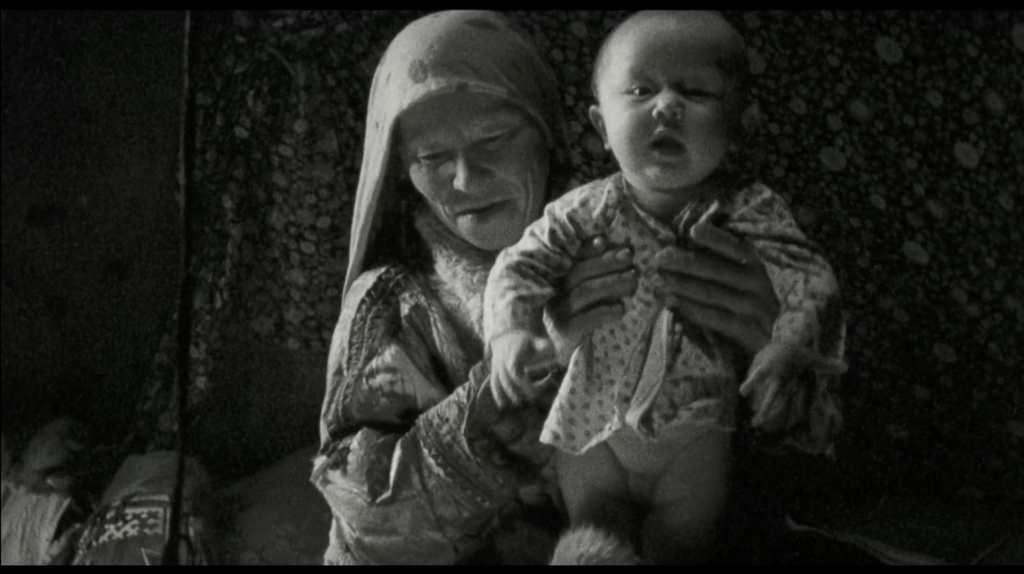
Nedarma
Nedarma (Travelling) is a documentary focusing on the Nenets, a nomadic tribe in the northern tundra of Siberia which Anastasia Lapsui was born into. Sumptuous 35mm black and white cinematography captures the landscapes of the Yamal Peninsula and the daily activities of its inhabitants with patience, a visionary perspective and a captivating soundtrack. The film begins by illustrating the Nenets cosmology as a way of leading into a filmic structure that portrays the arc of life from birth to death.
Programmer’s Note
Nekochako Lapsui’s narration guides the viewer along the different stages of life through poetry, song, and enigmatic prose. Scenes of overlaid colour animation augment the stunningly austere black-and-white images, resulting in brilliant splashes of colour – signifying the planes that lie beyond our earthly existence, unable to be captured in photorealist terms. The film’s soundtrack mixes the natural world with traditional Indigenous song, expertly scored by Anna-Kaisa Liedes and Kristiina Ilmonen. One of Anastasia Lapsui and Markku Lehmuskallio’s most accomplished documentaries, Nedarma is also a strong example of Indigenous ‘fourth cinema’, a term coined by Barry Barclay to describe films made by Indigenous people that are rooted in their concepts, words, setting, force and presence – perspectives the viewer experiences through immersion rather than explanation.
~ Herb Shellenberger
Director Biographies
Anastasia Lapsui (Nenets) is a filmmaker, screenwriter, and radio journalist born into a nomadic family in the Yamalo-Nenets Autonomous Okrug in 1944, northwest of Siberia. She has developed a highly original documentary and narrative filmmaking practice in collaboration with her partner, Markku Lehmuskallio. Together, they have produced elegant portraits of the Nenets, Sami, and other Indigenous peoples, incorporating traditional folktales and spiritual customs with meticulous depictions of their everyday lives. She studied at the Salekhard Pedagogical Institute (1963-1966) and Ural State University, becoming the first Indigenous radio journalist in Yamal. Her films have been widely exhibited at festivals and museums around the world, including the Berlinale, International Film Festival Rotterdam, Docpoint Helsinki, Toronto International Film Festival, Dok Leipzig, Midnight Sun Film Festival, and Karlovy Vary International Film Festival. She is the recipient of numerous awards including Finland’s top film prize, the Jussi Award, for Best Film (2000), Best Screenplay (2001) and Best Documentary Film (2003); Grand Prize from Festival International de Films de Femmes (2010); a Confédération Internationale des Cinémas d’Art et Essai Award from Berlinale Forum (2002); and the Finland Award (2009).
Markku Lehmuskallio is a film director and cinematographer born in 1938 in Rauma, Finland. His entry point into filmmaking began while working as a forester in Finland, where he created instructional films for farmers to teach them how to plant pine seedlings. This ecologically focused practice continued, and while filming in the Arctic regions of the former Soviet Union he met Anastasia Lapsui. They have since collaboratively produced numerous documentaries about the lives of Indigenous peoples in the Arctic Circle and around the world. Lehmuskallio’s films have been exhibited widely at venues around the world, including the Berlinale, International Film Festival Rotterdam, Docpoint Helsinki, Dok Leipzig, Midnight Sun Film Festival, Toronto International Film Festival, and Karlovy Vary International Film Festival, among many others. He is the recipient of numerous awards including Jussi Awards for Best Short Film (1973), Best Cinematography (1975), and Best Documentary Film (2003); an Honourable Mention from the Berlinale (1980); the Aho & Soldan Lifetime Achievement Award (2002); the Jury Prize Région de Nyon from Visions du Réel (2020); and the Finland Award (1998).
Director Filmographies
Anastasia Lapsui filmography (all co-directed with Markku Lehmuskallio): Pyhä (with Johannes Lehmuskallio, 2017), Tsamo (2015), Eleven Images of a Human (2012), Pudana – Last of the Line (2010), Earth Evocation (2009), Travelling (2007), The Sami (2006), Fata Morgana (2004), A Bride of the Seventh Heaven (2003), Mothers of Life (2002), Shepherd (2001), Seven Songs from the Tundra (2000), The Sacrifice – A Film about a Forest (1998), Anna (1997)
Markku Lehmuskallio filmography: Anerca, Breath of Life (with Johannes Lehmuskallio, 2020), Pyhä (with Johannes Lehmuskallio and Anastasia Lapsui, 2017), Tsamo (with Anastasia Lapsui, 2015), Eleven Images of a Human (with Anastasia Lapsui, 2012), Pudana – Last of the Line (with Anastasia Lapsui, 2010), Earth Evocation (with Anastasia Lapsui, 2009), Travelling (with Anastasia Lapsui, 2007), The Sami (with Anastasia Lapsui, 2006), Fata Morgana (with Anastasia Lapsui, 2004), A Bride of the Seventh Heaven (with Anastasia Lapsui, 2003), Mothers of Life (with Anastasia Lapsui, 2002), Shepherd (with Anastasia Lapsui, 2001), Seven Songs from the Tundra (with Anastasia Lapsui, 2000), The Sacrifice – A Film about a Forest (with Anastasia Lapsui, 1998), Anna (with Anastasia Lapsui, 1997), A Farewell Chronicle (1995), A Paradise Lost (1994), In the Shape of a Reindeer Across the Canopy of Heaven (1993), I Am (II) (1992), I Am (I) (1992), Inuksuk (1988), Finnish Mobile (1985), The Blue Mammy (1985), Skierri – Land of the Dwarf Birches (1982), The Raven’s Dance (1980), Mikä mies matsuri (1977), Elämän tanssi (1975), Tapiola (1974), The Swan (1974), Big Silence (1973), Muuttuva E-myymälä (1971), Ilta-Sanomat (1970)

